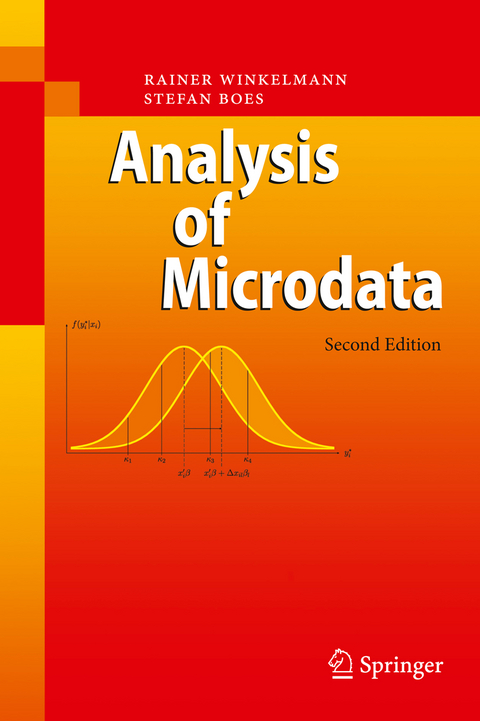
Analysis of Microdata
Springer Berlin (Verlag)
978-3-642-10083-3 (ISBN)
The availability of microdata has increased rapidly over the last decades, and standard statistical and econometric software packages for data analysis include ever more sophisticated modeling options. The goal of this book, now initssecondedition,istofamiliarizethereaderwithawiderangeofcommonly used models, and thereby to enable her/him to become a critical consumer of current empirical research, and to properly conduct own empirical analyses. The book can be used as a textbook for an advanced undergraduate, a Master's or a ?rst-year Ph.D. course on the topic of microdata analysis. In economicsandrelateddisciplines,suchacourseistypicallyo?eredaftera?rst course on the linear regression model. Alternatively, the book can also serve as a supplementary text to applied ?eld courses, such as those dealing with empirical analyses in labor, health or education. Finally, it might provide a useful reference for graduate students, researchers and practitioners who encounter microdata in their work. The focus of the book is on regression-type models in the context of large cross-section samples where the dependent variable is qualitative or discrete, or where the sample is not randomly drawn from the population of interest, due to censoring or truncation of the dependent variable. While our ba- groundisineconomics,andweoccasionallyrefertoproblemsandapplications fromempiricaleconomics,themodelsdiscussedinthisbookshouldbeequally relevant wherever microdata are used, inside the social sciences, including for example quantitative political science and sociology, as well as outside.
From Regression to Probability Models.- Maximum Likelihood Estimation.- Binary Response Models.- Multinomial Response Models.- Ordered Response Models.- Limited Dependent Variables.- Event History Models.
From the reviews:
"The book deals with the analysis of microdata where the usual conditional expectation functions (CEF) modeling is changed towards conditional probability functions (CPF). ... Numerous illustrations and numerical examples from the area of social sciences are declineated to show the utility and methodology of fitting a variety of models. This book provides subject matters different from routine books ... . The book will definitely enhance the knowledge of students and equip the researchers for proper analysis and reliable results." (B. L. Agarwal, Zentralblatt MATH, Vol. 1100 (2), 2007)
"Analysis of Microdata is comprised of eight chapters, which can be thought of as falling into two parts. ... At the time of writing this review I have just finished teaching a microeconometrics course using this book as the primary text. I found that it worked very well. Not only is the material well chosen but I thought it very well exposited. ... I cannot give any textbook a more ringing endorsement than that." (Christopher L. Skeels, Economic Record, March, 2007)
From the reviews of the second edition:
"Postgraduate students, researchers and practitioners in Economics, Social Sciences and related fields. ... The content here would normally be covered as part of an undergraduate degree course in Statistics. The statistical analyses presented are all likelihood-based. There are lots of examples and exercises, plus further exercises at the ends of chapters, solutions are provided for odd- numbered exercises. ... This is a thorough textbook with a clear remit and well-presented material which, in my view, is well-suited to its target readership." (Martin Crowder, International Statistical Review, Vol. 78 (1), 2010)
From the reviews:"The book deals with the analysis of microdata where the usual conditional expectation functions (CEF) modeling is changed towards conditional probability functions (CPF). … Numerous illustrations and numerical examples from the area of social sciences are declineated to show the utility and methodology of fitting a variety of models. This book provides subject matters different from routine books … . The book will definitely enhance the knowledge of students and equip the researchers for proper analysis and reliable results." (B. L. Agarwal, Zentralblatt MATH, Vol. 1100 (2), 2007)"Analysis of Microdata is comprised of eight chapters, which can be thought of as falling into two parts. … At the time of writing this review I have just finished teaching a microeconometrics course using this book as the primary text. I found that it worked very well. Not only is the material well chosen but I thought it very well exposited. … I cannot give any textbook a more ringing endorsement than that." (Christopher L. Skeels, Economic Record, March, 2007)From the reviews of the second edition:“Postgraduate students, researchers and practitioners in Economics, Social Sciences and related fields. … The content here would normally be covered as part of an undergraduate degree course in Statistics. The statistical analyses presented are all likelihood-based. There are lots of examples and exercises, plus further exercises at the ends of chapters, solutions are provided for odd- numbered exercises. … This is a thorough textbook with a clear remit and well-presented material which, in my view, is well-suited to its target readership.” (Martin Crowder, International Statistical Review, Vol. 78 (1), 2010)
| Erscheint lt. Verlag | 19.10.2010 |
|---|---|
| Zusatzinfo | XIV, 343 p. 39 illus. |
| Verlagsort | Berlin |
| Sprache | englisch |
| Maße | 155 x 235 mm |
| Gewicht | 539 g |
| Themenwelt | Mathematik / Informatik ► Mathematik |
| Sozialwissenschaften ► Soziologie | |
| Wirtschaft ► Allgemeines / Lexika | |
| Wirtschaft ► Volkswirtschaftslehre ► Ökonometrie | |
| Schlagworte | Analysis • Conditional Probability Models • Crosssection • Data Analysis • Event History Models • limited dependent variables • Maximum Likelihood • Qualitative Variables |
| ISBN-10 | 3-642-10083-X / 364210083X |
| ISBN-13 | 978-3-642-10083-3 / 9783642100833 |
| Zustand | Neuware |
| Informationen gemäß Produktsicherheitsverordnung (GPSR) | |
| Haben Sie eine Frage zum Produkt? |
aus dem Bereich


